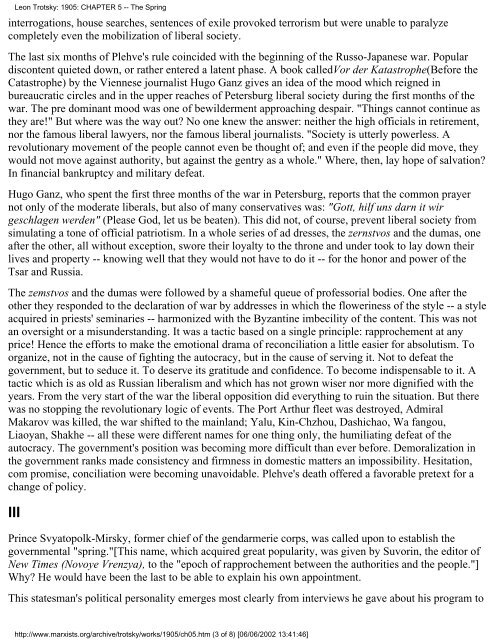Leon Trotsky: 1905
Leon Trotsky: 1905
Leon Trotsky: 1905
Create successful ePaper yourself
Turn your PDF publications into a flip-book with our unique Google optimized e-Paper software.
interrogations, house searches, sentences of exile provoked terrorism but were unable to paralyze<br />
completely even the mobilization of liberal society.<br />
The last six months of Plehve's rule coincided with the beginning of the Russo-Japanese war. Popular<br />
discontent quieted down, or rather entered a latent phase. A book calledVor der Katastrophe(Before the<br />
Catastrophe) by the Viennese journalist Hugo Ganz gives an idea of the mood which reigned in<br />
bureaucratic circles and in the upper reaches of Petersburg liberal society during the first months of the<br />
war. The pre dominant mood was one of bewilderment approaching despair. "Things cannot continue as<br />
they are!" But where was the way out? No one knew the answer: neither the high officials in retirement,<br />
nor the famous liberal lawyers, nor the famous liberal journalists. "Society is utterly powerless. A<br />
revolutionary movement of the people cannot even be thought of; and even if the people did move, they<br />
would not move against authority, but against the gentry as a whole." Where, then, lay hope of salvation?<br />
In financial bankruptcy and military defeat.<br />
Hugo Ganz, who spent the first three months of the war in Petersburg, reports that the common prayer<br />
not only of the moderate liberals, but also of many conservatives was: "Gott, hilf uns darn it wir<br />
geschlagen werden" (Please God, let us be beaten). This did not, of course, prevent liberal society from<br />
simulating a tone of official patriotism. In a whole series of ad dresses, the zernstvos and the dumas, one<br />
after the other, all without exception, swore their loyalty to the throne and under took to lay down their<br />
lives and property -- knowing well that they would not have to do it -- for the honor and power of the<br />
Tsar and Russia.<br />
The zemstvos and the dumas were followed by a shameful queue of professorial bodies. One after the<br />
other they responded to the declaration of war by addresses in which the floweriness of the style -- a style<br />
acquired in priests' seminaries -- harmonized with the Byzantine imbecility of the content. This was not<br />
an oversight or a misunderstanding. It was a tactic based on a single principle: rapprochement at any<br />
price! Hence the efforts to make the emotional drama of reconciliation a little easier for absolutism. To<br />
organize, not in the cause of fighting the autocracy, but in the cause of serving it. Not to defeat the<br />
government, but to seduce it. To deserve its gratitude and confidence. To become indispensable to it. A<br />
tactic which is as old as Russian liberalism and which has not grown wiser nor more dignified with the<br />
years. From the very start of the war the liberal opposition did everything to ruin the situation. But there<br />
was no stopping the revolutionary logic of events. The Port Arthur fleet was destroyed, Admiral<br />
Makarov was killed, the war shifted to the mainland; Yalu, Kin-Chzhou, Dashichao, Wa fangou,<br />
Liaoyan, Shakhe -- all these were different names for one thing only, the humiliating defeat of the<br />
autocracy. The government's position was becoming more difficult than ever before. Demoralization in<br />
the government ranks made consistency and firmness in domestic matters an impossibility. Hesitation,<br />
com promise, conciliation were becoming unavoidable. Plehve's death offered a favorable pretext for a<br />
change of policy.<br />
III<br />
<strong>Leon</strong> <strong>Trotsky</strong>: <strong>1905</strong>: CHAPTER 5 -- The Spring<br />
Prince Svyatopolk-Mirsky, former chief of the gendarmerie corps, was called upon to establish the<br />
governmental "spring."[This name, which acquired great popularity, was given by Suvorin, the editor of<br />
New Times (Novoye Vrenzya), to the "epoch of rapprochement between the authorities and the people."]<br />
Why? He would have been the last to be able to explain his own appointment.<br />
This statesman's political personality emerges most clearly from interviews he gave about his program to<br />
http://www.marxists.org/archive/trotsky/works/<strong>1905</strong>/ch05.htm (3 of 8) [06/06/2002 13:41:46]















![tyf Enf=O=n]lgg](https://img.yumpu.com/47584932/1/190x245/tyf-enfonlgg.jpg?quality=85)

